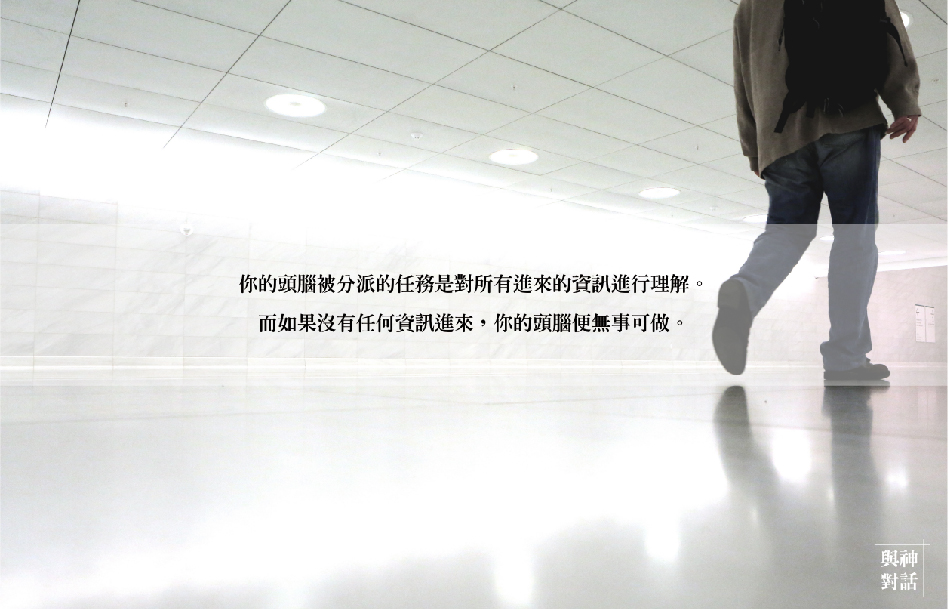
生活中「脫離心智」的好處:【「白色的比喻」the White Parable】-1/2 篇
想像你是在一個白色房間裡,有白牆、白地板、白天花板,沒有角落。想像你被某些看不見的力量懸吊在這樣的空間裡。你懸掛在半空中擺盪。你無法觸及任何東西,無法聽見任何東西,你看見的一切只是白色,你想這樣子你會在你自己的經驗裡「存在」(exist)多久?
尼爾:不會太久吧。我會存在那裡,但我不會知道有關自己的任何事。過不了多久,我就會脫離我的心智(go out of my mind,也是「我會發瘋」的意思)。
事實上,那正是你會做的事。你真的會脫離自己的頭腦。你的頭腦被分派的任務是對所有進來的資訊進行理解。而如果沒有任何資訊進來,你的頭腦便無事可做。

此刻,就在你脫離頭腦的瞬間,你便停止「存在自己的經驗裡」。也就是說,你對自己不再知道任何特定的事。
你是大?是小?你無從得知,因為沒有外在於你的東西可以拿來與你自己比較。
你是善嗎?是惡嗎?你無從分辨。你究竟是否存在這裡?你無法知道,因為這裡面沒有任何東西。
你無法在你自己的經驗裡得知關於自己的任何事。你可以盡量去「概念化」它,但你無法去「經驗」它。
然後有件事發生,開始改變所有這一切:牆上出現了一個小小的點,就好像有人帶著一支墨水筆進來,擠出了一小滴墨水。沒人知道那個點實際上是如何跑到那裡的。但是,沒有關係,因為那個小點拯救了你。
現在,有個「有別於你」的東西存在了:有你,有牆上的點。突然間,你又能夠做些決定了。你又能夠有些經驗了。那個點在「那邊」。那意味著你必然是在「這邊」。那個點比你小。你比它大。你再次開始定義你自己——相對於牆上的那個點。
你與那個點的關係變得神聖了,因為那關係還給了你一個「你對你自己的感受」。

現在有一隻小貓出現在房間裡。你不知道是誰這樣做,是誰在引發所有這一切,但你心懷感激,因為現在你可以做更多的決定了。小貓顯得比你柔軟,而你顯得比它聰明(至少,部分的時間是那樣)。它比較敏捷,你比較強壯。
更多事物開始在這房間出現,而你開始擴張你對自己的定義。然後,你覺悟到一件事:只有當別的事物在場時,你才能夠認識你自己。這些別的事物是你所「不是」的東西。故此:當你所「不是」的東西缺席時,你所「是」的東西……就不是了。(In the absence of that which You Are No, that which You Are…is not.)

你憶起了一個巨大的真理,而你暗自發誓不會再忘記它。你張開雙臂歡迎每個人、每個地方與每樣事物。你什麼都不排斥,因為你現在明白了,所有出現在你生命中的一切都是祝福,它們送給你更多的機會去定義你是誰,和去認識你所定義的自己。
摘自《與神為友》第9章
Imagine that you are in a white room, with white walls, white floor, white ceiling, no corners. Imagine that you are suspended in this space by some invisible force. You are dangling there, in mid-air. You cannot touch anything, you cannot hear anything, and all you see is whiteness. How long do you think that you will “exist” in your own experience?
Neale: Not very long. I’d exist there, but I wouldn’t know anything about myself Pretty soon, I’d go out of my mind.
Actually, that’s exactly what you would do. You would, literally, leave your mind. Your mind is the part of you that is assigned the task of making sense out of all incoming data, and without any data incoming, your mind has nothing to do.
Now, the moment you go out of your mind, you cease to exist in your own experience. That is, you cease to know anything in particular about yourself.
Are you big? Are you small? You cannot know, because there is nothing outside of yourself with which to compare yourself.
Are you good? Are you evil? You cannot know. Are you even here? You cannot know, because there is nothing over there.
You cannot know anything about yourself in your own experience. You can conceptualize it all you want, but you cannot experience it.
Then something happens to change all this. There appears a tiny dot on the wall. It’s as if someone has come along with a fountain pen and squirted a tiny dot of ink. Nobody knows how the dot actually got there, but it doesn’t matter, because the dot has saved you.
Now, there is something else. There is You, and there is the Dot On The Wall. Suddenly, you can make some decisions again, you can have some experiences again. The dot is over there. That means that you must be here. The dot is smaller than you. You are bigger than it. You are starting to define yourself again—in relationship to the Dot On The Wall.
More things begin appearing in the room, and you begin to expand your definition of Self. Then it dawns on you. Only in the presence of something else can you know yourself. This something else is that which you are not. Thus: In the absence of that which You Are Not, that which You Are.., is not.
You have remembered an enormous truth, and you vow never to forget it again. You welcome every other person, place, and thing in your life with open arms. You reject none of it, because you see now that all that appears in your life is a blessing, presenting you with a greater opportunity to define who you are, and to know yourself as that.

